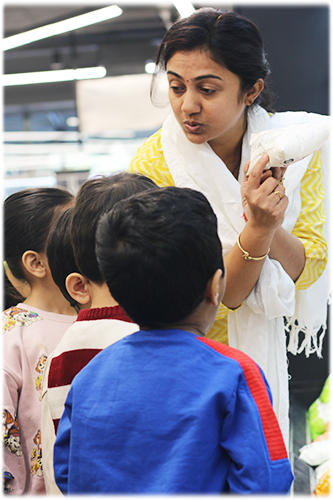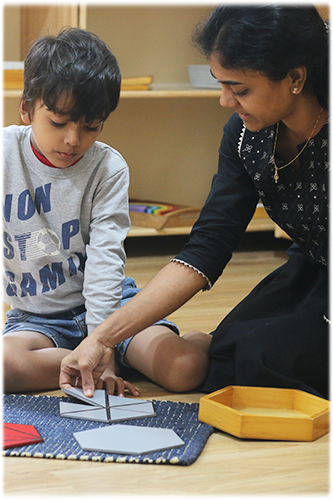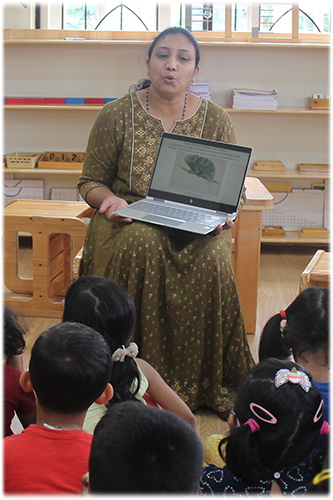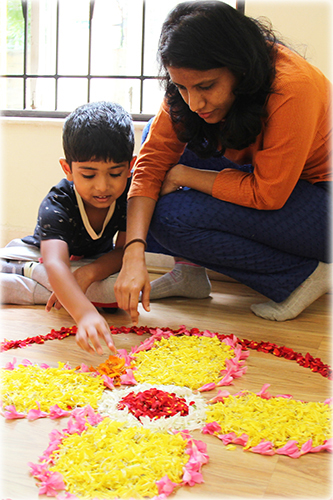Our faculty members
Ms. Lakshmi (Dip. Mont, MA, BA)
Diploma in Montessori: Navadisha Montessori, Chennai (AMI, Netherlands)
MA (Eng. Lit.): PSGR Krishnammal College for Women, Bharathiar University, Coimbatore
BA (Eng. Lit.): PSG College of Arts & Science, Coimbatore
Teaching was not my first career option until I dawned upon Maria Montessori’s philosophy. Right after my post graduation while I was fighting my ways to become a journalist, fortunately I was offered a job as a Montessori teacher. Little did I know that montessori had an entirely different viewpoint on education, especially early childhood learning. Led by my curiosity, I chose to take up the AMI course. I would say that the course was a life-changing experience. And as I began working with children, my curiosity transformed into my passion.
In my view, each child is different and so should the approach be. I believe that a montessori environment gives me the liberty to provide this individual attention to each child. Learning should be and can be made natural when we direct the child by observing the child’s learning pace and by teaching the right concept at the right time.
I believe in the adage “Teach by teaching, not correcting”. Not correcting does not mean ignoring the mistakes, but correcting in a constructive manner. I believe reprimanding is not the way of teaching. Nobody learns the correct-way, right from the beginning. If we try finding fault with the very first steps of learning (be it crawling, walking, talking, writing or reading) we are taking away the confidence the child has just begun to build.
Instead, keeping a note about the areas of improvement and then showing the child how to do it again is much more effective. Going from “this is not how you do it” to “this is how you do it” makes a lot of difference in a young child’s mind. A child needs constant encouragement and not resentment to reach the required goals.
For many, Montessori is a difficult choice to make due to its sheer uniqueness. It is a methodology less perceived and received. Though it does not fall under the usual or the traditional education patterns, it is par excellence when it comes to the needs of a child. Montessori is more than just learning the ABC’s and 123’s. The three key reasons why I recommend Montessori education for every child are:
1. The mixed-age-group and the 3-year span. Children learn from each other. Older ones act as role models for the younger ones. They learn to be compassionate and lead the young ones while the young ones feel supported and gain confidence. Working in a group they learn to sort their differences and meet their goals.
2. Beginning at an early age, children develop order, coordination, concentration, and independence. The classroom design, the materials, and the daily routines are conducive to learning.
3. Each child is valued. Montessori education accommodates all learning styles. Children learn at their own pace, each advancing through the curriculum as he is ready, guided by the teacher and an individualized learning plan.
The best thing that you could offer your child is to help him help himself. “Never help a child with a task which he thinks he can succeed in”. It’s easier said than done. As a teacher, at times, I find myself anxious and end up with an uncalled-for help. So I can imagine as a parent how difficult it is to resist the urge to help your loving child. But then if you want your child to be able and independent, the only way to do is consciously step back and let your child try. Give him a chance to explore his abilities. However young or old your child is and however big or small the task is: respect the child for his work
The Kite Runner by Khaled Hosseini. Many books come and go in your life and a few choose to stay. For me, The Kite Runner is one such book. It is a story of a father and son set against the morbidity of terror-struck Afghanistan. Even after a decade or more, of having read the book, the story is quite a memory.

Ms. Karuna (Dip. Mont., MBA, BBA)
Diploma in Montessori: Indian Montessori Training Centre, Bangalore
MBA (Finance), BBA: Karnataka College, Dharwad
I became a Montessori teacher because I love being with children and the love, laughter, mischief, creativity and imagination of children are like an eternal fountain of joy and vitality for me.
A child-centered educational approach based on scientific observation of children, which is in-line with the Montessori philosophy.
Firstly, Montessori method for young children provides for a holistic development of a child as it is structured around four main areas viz. Practical life, Sensorial development, Language and early preparation of Mathematical mind. Secondly, being a child-led method, it allows for children to learn at their own pace without any negative comparison or prejudice. And finally, Montessori method uses tangible materials to teach young children the abstract concepts. This leads to better understanding of concepts and is also useful during their later lives.
Children learn by observing adults. So, if adults inculcate all the good behaviors and habits, it is highly likely that children would learn the same.
Who will cry when you die? by Robin Sharma, as it tells about how to lead a purposeful life.

Ms. Veena (Dip. Mont., B.Com)
Diploma in Montessori: Indian Montessori Training Centre, Bangalore
Bachelor of Commerce: MES college, Bangalore
I became a Montessori teacher because I am passionate about educating children. I love spending time with children and guiding them in their growth and development.
I work as a guide and a facilitator to my students based on Maria Montessori’s child-centered approach. I give the child the freedom to choose and repeat the activities so that it helps him/her to become self- confident and independent.
The Montessori classroom is a specially prepared environment where children are free to choose from a range of activities appropriate for their development. This environment is conducive for the children to learn self-discipline and refine important skills such as concentration and self-control. The mixed-age classroom helps the older children enjoy stature as mentors and role models, thereby developing leadership skills; while younger children feel supported and gain confidence about the challenges ahead.
1. Be a role model yourself, as children observe and learn from adults.
2. Spend quality time with your child by reading a book together, have food together (as meal-time is a great time for conversations), catching up on the day and improving your relationship with him.
The Secret by Rhonda Byrne as it educates the reader about a universal paradigm about achieving success. The book tries to unveil this little secret, which may transform how people look at things and lead them on to the road of success and true happiness.

Ms. Chithra (Dip. Mont., B.E. (Computer Science))
Diploma in Montessori: Indian Montessori Training Centre, Bangalore
Bachelor of Engineering (Computer Science Engineering): Sri Krishna College of Technology, Coimbatore
Teaching always fascinated me ever since my childhood. However, having my degree in Computer Science Engineering, I was working in the software industry.
I then started feeling a disconnect from the purpose of my life. When I found out about Montessori, it seemed to answer all my questions. I felt it held a lot of value.
I am now in a more valuable and responsible position as a Montessori Directress. I’ve learned so much from my experience and the journey continues. I have definitely grown, not just as a Montessori Directress but as a human being as well.
I always believe: “To teach is to touch a soul”.
Through teaching we leave a part of ourselves with the child. As children do what we do and not what we say, I choose to demonstrate the behaviour of being gentle, positive, conscious and honest before I take it to children.
I feel this will make way to help children develop as a whole personality alongside emphasizing on life skills. I choose to observe the child, offer help when required and letting the child work at their pace without any prejudice.
It is based on the principle that children can learn best by working with their hands. A Montessori preschool has the least obstructive environment and is an ideal environment for learning. Moreover:
i) With mixed age group of children as an essence of Montessori environment, children are able to learn from each other, preparing them socially. They also learn the feeling of empathy from one another.
ii) Being child-centric, it is completely focused on what a child needs at that particular time. Each child is focused and valued.
iii) Offers children the space and the vital ingredient ‘Freedom’. Freedom to choose, work, repeat activities thereby strengthen their ability of being independent and unfolding the child’s potential.
i) Connection: Connect with your child by spending quality time. Always prefer connection over correction. It is known that, when the adults learn to listen to the child, the child will listen to learn.
ii) Help only when it is required: Help is effective only when it is offered at the right time and purpose. Let us set the environment for the child, step back and let the child’s hands be at work. The key to this is ‘Patience’. The smile on the child’s face when they figure it out on their own is always worth the wait.
iii) Boredom is okay: It enhances creativeness, independent work, boosts child’s imagination. If they run out of ideas we can help them with few options by talking about their interests.
The Power of Your Subconscious Mind by Joseph Murphy. I’m more drawn towards reading inspirational and self-development books.

Ms. Sireesha (Dip. Mont., B. Tech. (Computer Science))
Diploma in Montessori: Indian Montessori Training Centre, Bangalore
Bachelor of Technology (Computer Science Engineering), RGM College of Engineering and technology, AP.
I have passion for working with the children. I chose to be a Montessori adult as I can create a prepared environment that is conducive to learning and exploration, and to facilitate children’s individual learning journeys through observation, guidance, and feedback. I believe in Montessori approach of education which emphasizes a child-centered approach and encourages the development of independence, self-motivation, and creativity in children.
A individualized, focused and holistic approach on creating a positive learning environment that supports each child’s unique needs and interests. My teaching philosophy is “Follow the child and understand the child” as every child has a pattern of development.
The Montessori Method is a child-centered and self-directed approach in which children are viewed as active participants in their own development, strongly influenced by natural, dynamic, self-correcting forces within themselves, opening the way toward growth and learning. Montessori education emphasizes the development of practical life skills and encourages children to explore and learn at their own pace, which helps them develop confidence, self-esteem, and a sense of autonomy. Montessori classrooms caters the child requirements by providing
i) Carefully prepared, orderly, pleasing environments and materials where children are free to respond to their natural will.
ii) Exploration( Hand-on learning).
iii) Understand child’ sensitive periods and offers help accordingly.
iv) Mixed age group creates a natural environment for peer teaching and learning.
As a parent, you are your child’s first and most important teacher. Remember every child is different, and what works for one child may not work for another. Be patient, stay involved, and seek support when needed. With your love, encouragement, and support, your child will thrive.
1. Develop a routine: Children thrive on routine and consistency. Establish a daily routine for your child that includes a set time for waking up, eating meals, and going to bed. This will help them feel secure and develop good habits.
2. Read Every Day. Reading to a child opens her world in so many ways. Reading, apart from being the perfect time to bond, teaches vocabulary, problem solving, creativity, thinking skills, emotional maturity and so much more. It can be perfect bed time routine.
3. Allow Your Child to Be an Individual. Every person is different and every person has different strengths, weaknesses, interests, passions, etc. Being allowed to be an individual is one of your child’s basic emotional needs.
Atomic Habits by James Clear. I really liked this book because the way James Clear lays down the facts and the processes of becoming better are very helpful. This book helps us to understand that success is the product of daily habits, not once in a life time transformation.

Ms. Priya (Dip. Mont., M.Mgmt, B.Com)
Diploma in Montessori: MNTTA, Bangalore
Masters in Management (Mumbai University); Bachelor of Commerce (Mumbai University)
Teaching has always been an integral part of my life. Growing up in a family of educators, I have witnessed firsthand the profound impact that a teacher can have on a student’s life, and indirectly, on society as a whole. I believe that as each child progresses through different stages of learning, the teacher can tailor their instruction and support to guide the student through their learning journey.
During my time as a kindergarten teacher, I had the opportunity to observe many students who had been educated using the Montessori method. I was impressed by how these children were self-initiative and exhibited leadership qualities, meticulousness, and confidence in their work. After completing my training, I am convinced that this method of learning can provide children with a truly holistic development.
In this day and age, we need children who are equipped to transform society rather than merely transfer knowledge. As a Montessori teacher, I can be part of this transformation.
My teaching philosophy is built around the idea of placing the unique needs and interests of each individual child at the forefront of the child’s learning experience. Children are given the opportunity to explore and practice new skills through a variety of activities and physical interaction with the learning materials.
As a guide, the teacher should play a crucial role in facilitating this learning experience while empowering children to learn at their own pace and to ask questions and analyze their work, which is in accordance with the Montessori philosophy.
I believe that by making learning an enjoyable and engaging experience, children are much more likely to retain knowledge in a positive way.
One of the defining features of the Montessori method is the emphasis on hands-on learning experiences that engages all five senses.
In particular, the Montessori approach is highly effective when it comes to introducing children to key concepts in language and mathematics. By using concrete materials and a tactile approach, children can build a strong foundation in these subjects that is easy to understand and remember.
This stands in contrast to more abstract, book-focused approaches that can be less engaging for young learners.
Parenting is an ever-changing process that requires continuous learning and adaptation. My advice to parents is to lead by example because children learn through observation. It is important for parents to model the behavior they want their children to emulate.
Additionally, parents should teach their children the value of a growth mindset that emphasizes continuous learning and development regardless of the outcome. They should encourage the development of positive attributes rather than solely focusing on achieving success.
In addition, I believe that parents should encourage their children to engage in acts of volunteering. Volunteering can provide valuable experiences for children and help cultivate compassion and empathy in them.
I enjoy reading books on history, politics, and fiction. My favorite author is Jeffery Archer. His storytelling style is straightforward, yet his books are full of twists and turns. I appreciate how he incorporates various political views into his stories. I find his books thrilling and captivating, making them hard to put down.

